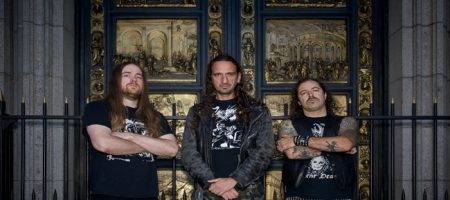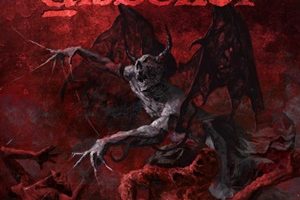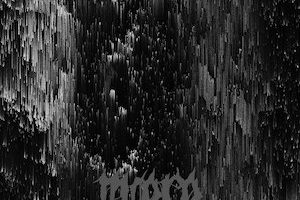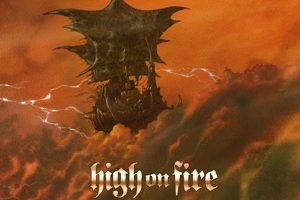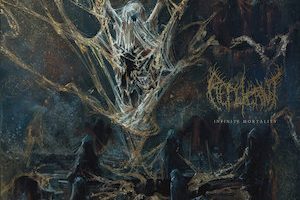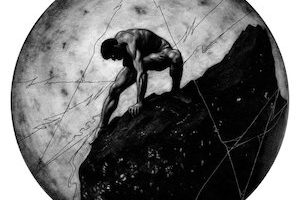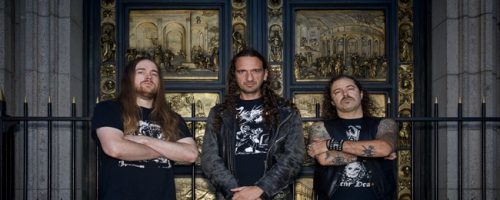Creeping Death – Hanging on the Edge of Existence
Thursday, 15th June 2023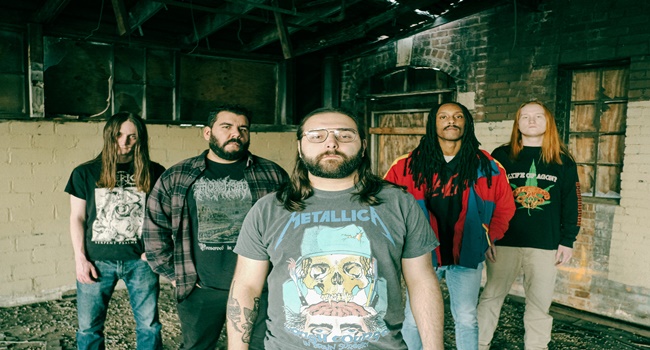
Photo Credit: Addrian Jafaritabar
Another in the younger breed of Texas artists combining a love of hardcore and death metal, Creeping Death have quickly moved up the ranks through consistent releases between demos, singles, EP’s and albums since starting in 2015. The second full-length Boundless Domain positions the quintet on an upward trajectory, their sound forceful, catchy, and quite addictive to a wide array of the underground (and above) heavy music community. We reached out to guitarist Trey Pemberton for this engaging conversation about his diverse background in music, working with Adam D. of Killswitch Engage for the new record, differences in North American/European audiences plus club show/festival thoughts, favorite eras of heavy music/bands, and what the future holds for touring to support the new record.
Dead Rhetoric: What are some of your first memories growing up in childhood concerning music? At what point did you discover heavier forms of punk, hardcore, or metal – and then eventually the desire to play an instrument and perform in your own bands?
Trey Pemberton: It started off pretty early. My mom is a pretty big metal fan, both my parents had diverse tastes. I grew up around metal, hip-hop, r and b, funk, soul, lots of 80’s music. My mom loves 80’s pop. It depended on what they were feeling that day, sometimes they wanted to cruise with the windows down listen to hip-hop, or sometimes my mom would blast Slayer. They would put on Rush, that’s how it started. It was always ubiquitous as a kid, lots of different types of music they would play. My mom was a drummer, she was the one buying me toys like a little snare drum, stuff like that. I finally got to the age where I was old enough to get a real drum set. She showed me a Rush DVD, the live video of “YYZ”, and I thought it was really cool. I had a drum set for my twelfth or thirteenth birthday, and I had been playing that ever since. I was in percussion and drumline in middle school and the first year of high school, but I ended up quitting for other sports.
Dead Rhetoric: And then from there you also learned how to play the bass and guitar, correct?
Pemberton: Yeah, I picked up guitar but that was much later. I was about twenty, I’m thirty now. That was a lot further down the road.
Dead Rhetoric: Boundless Domain is the second full-length for Creeping Death. What were the songwriting and recording sessions like for this outing – and where do you see this album sitting in the discography for the band?
Pemberton: The writing process is very much the same. We all kind of collaborate in the jam space when we get together. The biggest difference is we had a producer this time around – being able to send him the songs beforehand, him give us notes, rearranging things here and there. When we got physically in the studio with him, he was good about adding layers, different harmonies, just to make it a lot more interesting as a listen all the way through. I personally think as far as the discography, it’s the best thing we’ve done to date for sure. We were able to sit with the songs a little bit longer, workshop the songs longer. Having a producer give us notes definitely helped.
Dead Rhetoric: What was it like working with Killswitch Engage’s Adam Dutkiewicz as a producer on this record? Did he provide any special tips, tools, or insight during the process that proved to be beneficial for the final outcome?
Pemberton: For sure. He’s a wealth of information. His random ideas, trying new things. If I didn’t like the way something sounded that he suggested, we would scrap it and try something else. He has a wealth of knowledge of tones, the guitar itself. Just different harmonies, adding things to get things to sound stronger. Layers, but it was an instrumental part of that. He got us to play with our performances so much better on record. He won’t accept anything less than a ten out of ten, almost robotic thing. It forces you to up your game and get better at your craft – and that goes for all of us. Drums, vocals, all the stringed instruments. It was challenging but a lot of fun. He’s a lot of fun to be around – he likes to drink beer and hang out, and so do we. We like to rib each other in the band, it definitely fit in really well for the vibe, so it was really cool.
Dead Rhetoric: Can you think of any specific songs that took on the greatest transformation from the initial demo to the final outcome?
Pemberton: “The Parthian Shot”, we sent him that demo first. He had us rearrange the structure, to where it sounds completely different. The riffs are the same, but they are rearranged in such a way that it made a huge difference. Also, another track where he had an idea to sort of put a lead part over a heavy, dronie part – he came up with the idea that helped us to get to what we wanted. “Cursed”, he helped in the structure of that song – conveying the vibe that we wanted but keeping it interesting throughout. Those songs for sure.
Dead Rhetoric: Where did you want to come across with the lyrical content – does it differ from past subjects?
Pemberton: See, I’m the music guy. Lyrics, that’s always been a blind spot for me, even in my favorite songs of all time, I may not know the words to them. All of our lyrics are written by our singer Reese, and from what I’ve gathered, deals with existential threats that we bring upon ourselves. Humans are fast tracking their demise, stuff like that. There are other meanings that Reese tries to work in, underlying themes with a mask of fantasy elements to it.
Dead Rhetoric: You mention in the bio sheet that you are a selfish band in the sense of writing music for yourselves. At this point, what trademarks or specific elements have to be there to make the final grade for a Creeping Death song?
Pemberton: I don’t think there is one. If we like it, and if it’s fun to play, that’s pretty much it. We don’t try to think about it too much. You hear something, do we like this, do we want to keep working on it? If it’s not something that we all are not in on from the jump, then we will scrap that. Or what do you not like about it, so we can change it?
Dead Rhetoric: Now that you’ve been able to tour domestically and abroad for a few years, how would you describe what people can expect when hearing Creeping Death live – and what do you think you’ve learned the most from other, more experienced bands that you’ve been able to apply to the touring philosophy or stage show ethics?
Pemberton: I think if people don’t know us and they are seeing us for the first time, they are going to get a lot of energy. It’s very frenetic, we don’t stop a whole lot, in a set we may stop twice as we like to just keep playing through. We keep the energy going, keep it moving.
We try to take something from every band we’ve played with. It doesn’t matter if they are bigger than us, younger than us, more or less experienced. There is always something that you can learn from everybody. Things people do that maybe you wouldn’t think of doing in a certain way. We try to learn and take away something from everyone we’ve toured with as much as possible. Business things, or places to go, places to eat, how to show up, or personal things like how many bags to take, stuff like that. Also, how to EQ stuff, fix and do something on the road. Your own maintenance, you end up picking stuff up from others, and it’s a good experience.
Dead Rhetoric: Do you feel your style of music is accepted on a global scale – how was it to play to the overseas audiences compared to how you are accepted stateside?
Pemberton: The Europeans really like it for sure – but culturally, at shows over there they are more about the headbang. You can tell when people are super into it, but even then, people don’t mosh as much – some circle pits. People get way more rowdy in North America – I wouldn’t even say just the states because Canada is pretty lit too. Much more energy, much more going on. I don’t think they hate it, the general thing that I see even from live videos from other bands, you’ll see a set somewhere in the states and people are jumping off the walls, going crazy – and then you’ll see a set from somewhere in Europe you’ll see circle pits, headbanging, but it’s tamer over there.
Dead Rhetoric: Do you have any preferences on club shows versus festival settings?
Pemberton: I like club shows a lot more. A lot more intimate, a lot more fun. With the festivals, they are a lot of fun to play to a lot of people, the hospitality for those fests is pretty cool. Sometimes the logistics of it, there are a lot of moving parts because they have to coordinate between a lot of bands and a lot of people. That can be annoying, it’s a little bit less personal usually because it’s a bigger crowd and you are a lot further away. We’ve played the Wrecking Ball Metal Madness fest that Frozen Soul puts on, about 1,000 cap room sold out and it feels more like a club show even though it’s a festival. That’s a lot of fun. We played the Sound and Fury festival in California, 5,000 people. The hospitality was amazing, it was outdoors, and I don’t like playing outdoors as much as I like playing indoors. That has it’s own limitations.
Dead Rhetoric: Where do you see the differences between the new generation of death metal acts making an impact on the scene and the pioneers/originators?
Pemberton: I would say there is a slight difference. Obviously, a lot of the younger bands are influenced by the older bands. I also think it will sound a bit different because the younger people are looking at it from a different lens. A lot of the younger people come up through different avenues to music. Someone who is thirty like me, they had many different phases from metalcore to hardcore to death metal, thrash metal – and at some point, when you get older, you just like what you like. Younger people are listening to more stuff, even EDM and hip-hop. I don’t think it’s necessarily better or worse, I just think it’s different. You couldn’t disseminate information back then the same way you can now. In 1991, tapes were sent back and forth, you were listening to stuff on the radio, of course you won’t have a chance to branch out and listen to a lot more stuff. The internet changed everything. It’s the big difference, kids having access to information from almost birth as opposed to having to seek things out. It’s just two different schools of thought.
Dead Rhetoric: That makes sense, as I heard sometimes you pull influences from other genres like reggaeton or hip-hop and apply it in a metal context with this band, is that true?
Pemberton: Oh yeah. For me, it’s not necessarily about what the riff is sounding like. It’s more about what does the feeling want to convey by the beat that’s playing. Do I want a part that will lay back and groove, as if you are chilling listening to DJ Screw or some southern rap, play this beat with these rhythms behind it to get that same kind of groove. That’s how I think about it.
Dead Rhetoric: How is the balance at this point between pursuing your musical career and also having to supplement income through day jobs? Are you hopeful (or realistic) when it comes to developing a full-time income musically (or through music-related pursuits)?
Pemberton: I think we all try to do the best that we can and make the most money that we can with the music thing. Also, being realistic, inflation is crazy, and things are getting more expensive. All of us, as much as we don’t want to work, even if we were at the point where we didn’t have to work at all, we would probably all still do something because we would probably be bored. Sitting at home doing nothing is fun for the first couple of weeks, after a while, if there isn’t a tour for four to eight weeks, you might as well do a side hustle to make money on the side. We are trying to strive to the point where we can pay all of our bills with the band, and if we choose to do something on the side in the time that’s left over, because we have the time to get extra money, we will do it. Right now, even the biggest bands still have second jobs.
Dead Rhetoric: What are three albums that you believe had the most impact on your views of heavy music – and what’s the best concert memory you have attending a show/festival purely as an audience member, and what made that show so special to you?
Pemberton: Three for heavy music. That’s a hard question. It’s easier to go by eras. For the 80’s, it’s a cop out with Slayer – Reign in Blood and Metallica – their run in the 80’s. Those two elevated heavy music to a completely new level. Metallica for the mainstream, and Slayer for more of the underground. For Slayer, you could be hugely massive in the underground, and you didn’t have to play the commercial stuff. In the 90’s, it gets hard. That’s when the death metal got good – Obituary, Cannibal Corpse, they pushed the death metal thing beyond the underground. In the new days, Power Trip is pretty unmistakable. They led the resurgence of thrash, metal and hardcore, which led to the resurgence of hardcore kids getting into all styles of metal, death, grind.
The show thing. One of my favorite concert memories. At one time, my sophomore year of college, it was the weekend of finals. A show got announced at the last minute in Austin, Texas. At the time, Odd Future the rap group, they are sort of friends with this band called Trash Talk. They were doing after shows, DIY, hardcore shows. We knew about the one in Dallas as it was Trash Talk, Power Trip, and Code Orange Kids. The night of the Dallas show there was a rumor that Iron Age was going to do a reunion show in Austin with Trash Talk as the secret show. It was confirmed the day of. It was a ripping show. I had a final that weekend, I was going to flunk. I convinced myself I would be fine; my friends had a spot in the car. We saw an incredible show. I saw Frank Ocean stage dive and mosh to Iron Age, I was headbanging with my friends. It was a lot of fun, seeing awesome legendary bands. Pop stars stage dive, it was crazy.
Dead Rhetoric: If you had the opportunity to teach a high school or college-level course on any subject matter of your choosing (outside of the field of music), what type of course would you like to develop and why do you think this would be important to teach?
Pemberton: I would probably teach something to do with sports – sports journalism, sports management, something like that. I wouldn’t say it’s important in the grand scheme of things, it’s just entertainment, but I was thinking about also what I could teach well. That’s one of the things I could impart a lot of knowledge about. Sports, sports teams, marketing, things like that.
Dead Rhetoric: Growing up playing sports and also being a kickboxer to maintain fitness, what do you think you’ve learned through these disciplines as far as teamwork or mental/ physical abilities that you’ve applied to your craft in music?
Pemberton: Not quit when things suck or get hard. Initially when I first got my guitar, I didn’t play for two years. I was concentrating on drums, the initial jumping off point was difficult. I always tell people, it’s harder to master drums than guitar, but it’s easier to start off on drums than guitar. It was really weird at first, once I got past that, the years after I didn’t care if I was good at it, I just kept practicing. Tough it out to the best of your ability.
Dead Rhetoric: What’s on the agenda for things related to Creeping Death over the next twelve months or so?
Pemberton: We have a ton of tours. We are doing a headlining tour in less than a month, with Year of the Knife, Fleshrot, and Saintpeeler on the West Coast, and then on the East Coast we have Upon Stone, Enforced, and Saintpeeler as well. We decided to split the legs in half, so we have two weeks on the West Coast, and a week to ten days off before two weeks on the East Coast. It should be a lot of fun. We have some tours in the fall that we can’t quite announce yet, that will be super sick. We should be heading back to Europe early next year. We are just keeping the train rolling.











